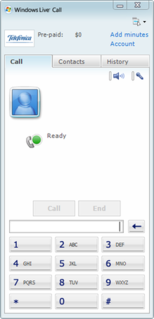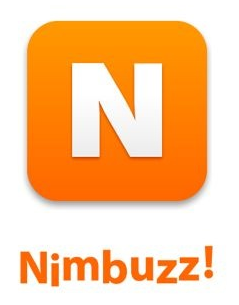Related Research Articles

AIM was an instant messaging and presence computer program created by AOL, which used the proprietary OSCAR instant messaging protocol and the TOC protocol to allow registered users to communicate in real time.

ICQ is a cross-platform messenger and VoIP client. The name ICQ derives from the English phrase "I Seek You". Originally developed by the Israeli company Mirabilis in 1996, the client was bought by AOL in 1998, and then by Mail.Ru Group in 2010.
Voice over Internet Protocol (VoIP), also called IP telephony, is a method and group of technologies for the delivery of voice communications and multimedia sessions over Internet Protocol (IP) networks, such as the Internet. The terms Internet telephony, broadband telephony, and broadband phone service specifically refer to the provisioning of communications services over the Internet, rather than via the public switched telephone network (PSTN), also known as plain old telephone service (POTS).

Yahoo! Messenger was an advertisement-supported instant messaging client and associated protocol provided by Yahoo!. Yahoo! Messenger was provided free of charge and could be downloaded and used with a generic "Yahoo ID" which also allowed access to other Yahoo! services, such as Yahoo! Mail. The service also offered VoIP, file transfers, webcam hosting, a text messaging service, and chat rooms in various categories.
HCL Sametime is a client–server application and middleware platform that provides real-time, unified communications and collaboration for enterprises. Those capabilities include presence information, enterprise instant messaging, web conferencing, community collaboration, and telephony capabilities and integration. Currently it is developed and sold by HCL Software, a division of Indian company HCL Technologies, until 2019 by the Lotus Software division of IBM.

Skype for Business Server is real-time communications server software that provides the infrastructure for enterprise instant messaging, presence, VoIP, ad hoc and structured conferences and PSTN connectivity through a third-party gateway or SIP trunk. These features are available within an organization, between organizations and with external users on the public internet or standard phones.

Jajah was a VoIP provider, founded by Austrians Roman Scharf and Daniel Mattes in 2005. The Jajah headquarters was located in Mountain View, CA, USA, and Luxembourg. Jajah maintained a development centre in Israel. On 23 December 2009, it was announced that Jajah had been bought by Telefónica through its subsidiary Telefónica Europe. In December 2013, Telefónica announced that Jajah would shut down at the end of January 2014.
Mobiola is a wide range of software by SHAPE Services.
This is a comparison of voice over IP (VoIP) software used to conduct telephone-like voice conversations across Internet Protocol (IP) based networks. For residential markets, voice over IP phone service is often cheaper than traditional public switched telephone network (PSTN) service and can remove geographic restrictions to telephone numbers, e.g., have a PSTN phone number in a New York area code ring in Tokyo.

Windows Live Call was part of Microsoft's Windows Live services. It integrated into Windows Live Messenger to allow users to make PC-to-PC and PC-to-Phone voice and video calls. Microsoft partnered with telecommunication companies around the world to allow users to use a PC equipped with a microphone and speakers and a high speed Internet connection to call almost any regular telephone anywhere in the world.
Google Voice is a telephone service that provides call forwarding and voicemail services, voice and text messaging, as well as U.S. and international call termination for Google Account customers in the U.S., and for Google Workspace customers in Canada, Denmark, France, Netherlands, Portugal, Spain, Sweden, Switzerland, and the UK. The service was launched by Google on March 11, 2009, after the company had acquired the service GrandCentral.
Yahoo Voice was a Voice over IP PC-PC, PC-Phone and Phone-to-PC service, provided by Yahoo via its Yahoo Messenger instant messaging application. Yahoo Voice uses the Session Initiation Protocol (SIP), GIPS codec and the Dialpad engine for voice transport. Since 2008 the service has been provided by JAJAH, an outsourced VoIP provider. During July 2012, Yahoo voice has been compromised and 453,491 email address and their passwords were hacked. This major devastation was achieved via SQL injection. A 17 MB text file containing the stolen passwords was released by a group of hackers called D33DS company. In relation with this issue, Yahoo advised users to change their passwords as soon as possible. In Yahoo Messenger Blog, they announced the end of Yahoo Voice on January 30, 2013.
eVoice is a telecommunications service owned by j2 Global, Inc. (NASDAQ:JCOM) that manages incoming and outgoing calls using a virtual phone number. The service was founded by Wendell Brown, Mark Klein, and Craig Taro Gold in 2000 and re-launched in March 2010 with new features, targeting entrepreneurs and small businesses.
iConnectHere is the consumer division of Deltathree, which provides VoIP internet telephony service to consumers and businesses worldwide. The company's products are: Broadband (Internet) Phones, PC to Phone service, Mobile Dialers, Calling Cards and local phone numbers.
Rakuten Viber, or simply Viber, is a cross-platform voice over IP (VoIP) and instant messaging (IM) software application operated by Japanese multinational company Rakuten, provided as freeware for the Android, iOS, Microsoft Windows, macOS and Linux platforms. Users are registered and identified through a cellular telephone number, although the service is accessible on desktop platforms without needing mobile connectivity. In addition to instant messaging it allows users to exchange media such as images and video records, and also provides a paid international landline and mobile calling service called Viber Out. As of 2018, there are over a billion registered users on the network.

FriendCaller is a Video and Voice over Internet protocol developed by C2Call GmbH based in Werl, Germany. Its proprietary Voice-Over-Internet technology was originally created by Michael Knecht and Martin Feuerhahn. It was a first prototype developed by Actai Networks GmbH in 2007; the technology was then transferred to C2Call GmbH in 2008. Later on, FriendCaller was launched in 2009 as a website and as an iOS app. FriendCaller establishes peer-to-peer connectivity and allow users to communicate one-to-one or in groups via Video Chat, Voice over IP, Instant messaging, Texts/SMS, and phone calls.
Facebook Messenger is an American messaging app and platform developed by Facebook, Inc. Originally developed as Facebook Chat in 2008, the company revamped its messaging service in 2010, and subsequently released standalone iOS and Android apps in August 2011 and standalone Facebook Portal hardware for Messenger-based calling in Q4 2018. Later on, Facebook has launched a dedicated website interface (Messenger.com), and separated the messaging functionality from the main Facebook app, allowing users to use the web interface or download one of the standalone apps. In April 2020, Facebook officially released Messenger for Desktop, which is supported on Windows 10 and macOS and distributed on Microsoft Store and App Store respectively.

Nimbuzz is a proprietary cross-platform instant messaging and voice-over-IP provider and aggregator for smartphones, tablets and personal computers developed by MSM Global Holdings Limited, with the origins of its technology dating back to the early 2000s. As of March 2013, Nimbuzz had 150 million users in 200 countries. By April 2014, Nimbuzz was growing by more than 210,000 new registrations per day. In October 2014, now with over 200 million users, New Call acquired 70% of Nimbuzz, valuing the app at $250 million. Under CEO Vikas Saxena's leadership from March 2015, the Nimbuzz suite of applications enables users to enjoy free calls, instant messaging, social-network games, file sharing, and social networking on their mobile device. In addition, Nimbuzz offers discounted calling rates to most countries in the world. The platform processes more than a billion call minutes and in excess of 100 billion messages a month. The Nimbuzz site and servers went offline in mid-2019 and remain unavailable as at August 2020, although from August 2019 their Facebook page promises to relaunch soon as Nimbuzz Kuraakani.

Upptalk was a proprietary voice-over-IP service and software application that provided mobile phone numbers in the cloud and allows users to call or text any phone for free whether or not the device receiving the calls and texts has the Yuilop application. The service was discontinued in 2017 and even its domain was abandoned.
Comparison of user features of messaging platforms refers to a comparison of all the various user features of various electronic instant messaging platforms. this includes a wide variety of resources; it includes standalone apps, platforms within websites, computer software, and various internal functions available on specific devices, such as iMessage for iPhones.